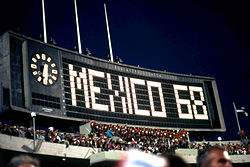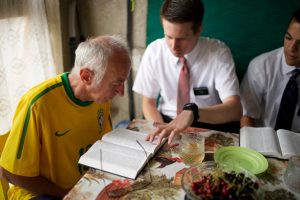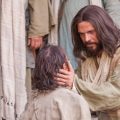I love a good story.
Some of my favorites come from family or personal experiences; others come from third parties that have a brilliant message to share. Regardless, they are worth repeating and remembering. You decide:

1968 Olympics Opening ceremony
During the 1968 Olympics in Mexico City, John Stephen Akhwari placed last in the marathon, yet major sports magazines named him as one of two “top international Olympians” that year. While losing the race, Mr. Akhwari won the admiration of untold thousands because he embodied the spirit of a true Olympian as he finished despite setbacks.
Track and field athletes that year faced a common challenge when they arrived in Mexico City: its altitude. At 7,350 feet, it was the highest elevation at which any Summer Olympics had been held. From Mbulu, Tanzania, where the altitude is -3.85 feet, Mr. Akhwari suffered leg cramps early in the race. Yet he continued to run.
He collided with another runner and fell, dislocating and badly cutting a knee and injuring a shoulder. He got up and he continued to run.
By sunset, most of his 56 fellow competitors had finished the race. Wounded and in pain, he continued to run. Most spectators had left the arena where the marathon’s finish line was located.
Those who remained noticed lights flashing on a vehicle escorting a lone runner and cheered as the Tanzanian hobbled along the track in his own victory lap to cross the finish line more than an hour after the winner.
It’s doubted that anyone present realized they were witnessing a great moment in the history of the Olympics. Many journalists and people posting on various media have told the story of Mr. Akhwari’s personal victory. In a New York Times article upon the death of Bud Greenspan in 2010 is this account:
“Mr. Greenspan, an eight-time Emmy Award winner, often distilled his view of the Olympics into an incident from the 1968 Summer Games in Mexico City. He was shooting the marathon, which was won by an Ethiopian, Mamo Wolde.
“But what mesmerized him was John Stephen Akhwari of Tanzania. … When Mr. Greenspan asked him why he continued to the end, Mr. Akhwari was incredulous at such a question. ‘My country did not send me 5,000 miles to start the race,’ Mr. Greenspan often recalled him saying. ‘My country sent me 5,000 miles to finish the race’” (Richard Sandomir, www.nytimes.com/2010/12/26/sports/olympics/26greenspan.html)
The Rabbi and the Soap Maker
Another inspiring anecdote was shared by President Dieter F. Uchtdorf in our recent April conference. It impacted me even more after its delivery when I read it in the Ensign. Do you remember this?

There is an old Jewish tale about a soap maker who did not believe in God. One day as he was walking with a Rabbi, he said, “There is something I cannot understand. We have had religion for thousands of years. But everywhere you look there is evil, corruption, dishonesty, injustice, pain, hunger, and violence. It appears that religion has not improved the world at all. So I ask you, what good is it?”
The Rabbi did not answer for a time but continued walking with the soap maker. Eventually they approached a playground where children, covered in dust, were playing in the dirt.
“There is something I don’t understand,” the Rabbi said. “Look at those children. We have had soap for thousands of years, and yet those children are filthy. What good is soap?”
The soap maker replied, “But Rabbi, it isn’t fair to blame soap for these dirty children. Soap has to be used before it can accomplish its purpose.”
The Rabbi smiled and said, “Exactly.”
Not to worry
In 1989 there was a terrible earthquake in Armenia that killed over 30,000 people in four minutes. A distraught father went in frantic search of his son. He reached his son’s school only to find that it had been reduced to a pile of rubble.
 But he was driven by his promise to his son, “No matter what, I’ll always be there for you!” He visualized the corner where his son’s classroom would be, rushed there, and started to dig through the debris, brick by brick.
But he was driven by his promise to his son, “No matter what, I’ll always be there for you!” He visualized the corner where his son’s classroom would be, rushed there, and started to dig through the debris, brick by brick.
Others came on the scene—the fire chief, then the police—warning him of fires and explosions, and urging him to leave the search to the emergency crews. But he tenaciously carried on digging. Night came and went, and then, in the 38th hour of digging, he thought he heard his son’s voice.
“Armand!” he called out. Then he heard, “Dad!?! It’s me, Dad! I told the other kids not to worry. I told ’em that if you were alive, you’d save me and when you saved me, they’d be saved. …
“There are 14 of us left out of 33. … When the building collapsed, it made a wedge, like a triangle, and it saved us.”
“Come on out, boy!”
“No, Dad! Let the other kids out first, ’cause I know you’ll get me! No matter what, I know you’ll be there for me!”
All family relationships should be honored including those to our kindred dead. In that way love, service, and help will flow between brothers and sisters and extended family. We are here for them.
Dirty little Irish kid
Those of us who have served missions have seen the miracle in the lives of some we have taught as they have come to realize that they are sons and daughters of God.
 Many years ago an elder who served a mission in the British Isles said at the end of his labors, “I think my mission has been a failure. I have labored all my days as a missionary here, and I have only baptized one dirty little Irish kid. That is all I baptized.”
Many years ago an elder who served a mission in the British Isles said at the end of his labors, “I think my mission has been a failure. I have labored all my days as a missionary here, and I have only baptized one dirty little Irish kid. That is all I baptized.”
Years later, after his return to his home in Montana, he had a visitor come to his home who asked, “Are you the elder who served a mission in the British Isles in 1873?”
“Yes.”
Then the man went on, “And do you remember having said that you thought your mission was a failure because you had only baptized one dirty little Irish kid?”
He said, “Yes.”
The visitor put out his hand and said, “I would like to shake hands with you. My name is Charles A. Callis, of the Council of the Twelve of The Church of Jesus Christ of Latter-day Saints. I am that dirty little Irish kid that you baptized on your mission.”
Wherefore didst thou doubt
Definitely one of my favorite scripture accounts is that of Jesus providing a meal for 5000 people with only five loaves and two fishes. It has direct application to us because the Savior has power to transform life and hardship despite our skepticism if we will but believe and follow him.
In the video of that account, note how even his apostles look at the Lord in amazement when asked to prepare for the miracle that is about to happen, yet they follow him and do as he asks. They help realize the miracle by participating in it. Afterward, they carry the bounty of leftovers following the miracle and its blessings.
And so it is in life, if we will follow Jesus Christ and look to him in faith; hardships become manageable and difficulties, surmountable. The amazing and incomprehensible becomes reality. After healing the sick, Christ fed all 5000 yet still 12 baskets remained. That is exactly how he blesses true believers.
About Walter Penning
In 1989, Walter Penning formed a consultancy based in Salt Lake City and empowered his clients by streamlining processes and building a loyal, lifetime customer base with great customer service. His true passion is found in his family. He says the best decision he ever made was to marry his sweetheart and have children. The wonderful family she has given him and her constant love, support, and patience amid life's challenges is his panacea.
Twitter •







